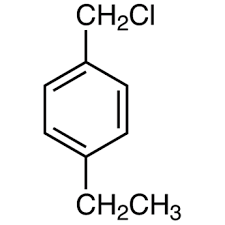HI! I’M ELEMENT AI.
Ethyl Benzene Chloride

Product Description
Ethyl benzene chloride, also known as ethyl benzyl chloride, is a chemical compound with various industrial applications.
Product:
Ethyl Benzene Chloride
CAS:
1467-05-6
Synonym:
4-Ethylbenzyl chloride; 1-(Chloromethyl)-4-ethylbenzene
Structure:

Typical Characteristics
Appearance
Colorless clear liquid
Boiling point
111 ºC/25mmHg
Density
1.05 g/cm3
Flash Point
82.7 ºC
Melting point
-21 ºC
Molecular Weight
154.64
Purity
99%
Uses, Applications & Markets
Key applications
get a quote
We Offer Ethyl Benzene Chloride
in various grades
A few of the grades available are listed below:



Ethyl Benzene Chloride used in many
industry applications
Ethyl benzene chloride, also known as ethyl benzyl chloride, is a chemical compound with various industrial applications. Here's a summary of its main uses:
- Chemical Intermediate: Ethyl benzene chloride serves as a valuable intermediate in organic synthesis, particularly in the production of pharmaceuticals, agrochemicals, and specialty chemicals. It undergoes various chemical reactions, including nucleophilic substitution and addition reactions, to form complex organic molecules with diverse functional groups.
- Surfactants and Emulsifiers: It finds application in the formulation of surfactants, emulsifiers, and surface-active agents used in the manufacture of cleaning products, personal care products, and industrial chemicals. Ethyl benzene chloride-based surfactants help reduce surface tension, improve wetting and dispersing properties, and enhance the stability and performance of liquid formulations.
- Flavors and Fragrances: Ethyl benzene chloride may be employed in the synthesis of aroma compounds and flavoring agents used in the food and beverage industry. It contributes to the creation of specific aroma profiles and flavor profiles in food products, beverages, and fragrances, enhancing their sensory attributes and consumer appeal.
- Plasticizers: It is used as a plasticizer or softening agent in the production of flexible PVC (polyvinyl chloride) plastics and polymer materials. Ethyl benzene chloride helps improve the flexibility, durability, and processability of PVC products, such as vinyl flooring, cable insulation, and synthetic leather, by reducing brittleness and enhancing plasticity.
- Adhesives and Sealants: Ethyl benzene chloride may be incorporated into the formulation of adhesives, sealants, and coatings to enhance their adhesive strength, cohesion, and moisture resistance. It acts as a reactive diluent or crosslinking agent, facilitating the polymerization or curing of adhesive formulations and improving their bonding performance on various substrates.
- Textile Chemicals: It is utilized in the textile industry as a dye intermediate, textile finishing agent, or fabric treatment chemical. Ethyl benzene chloride-based chemicals help impart desired color, texture, and performance properties to textile materials, such as cotton, polyester, and nylon, in dyeing, printing, and finishing processes.
- Corrosion Inhibitors: Ethyl benzene chloride may serve as a corrosion inhibitor or rust preventive additive in metalworking fluids, lubricants, and industrial coatings. It forms a protective film or barrier on metal surfaces, inhibiting the corrosive attack of moisture, oxygen, and reactive chemicals, and prolonging the service life of metal components and equipment.
- Solvents: It can be used as a solvent or solvent component in various industrial processes, chemical reactions, and cleaning applications. Ethyl benzene chloride exhibits moderate solvency power and compatibility with a wide range of organic and inorganic compounds, making it suitable for solvent-based formulations in paint, ink, and adhesive industries.
- Research and Development: Ethyl benzene chloride may be employed in laboratory research, chemical synthesis, and process development as a versatile reagent or starting material. It enables the synthesis of novel compounds, the exploration of new reaction pathways, and the optimization of chemical processes in academic and industrial research laboratories.
- Agrochemical Intermediates: It finds application in the synthesis of intermediates and active ingredients used in the production of herbicides, insecticides, and fungicides for agricultural and horticultural applications. Ethyl benzene chloride serves as a key building block in the synthesis of agrochemical formulations aimed at pest control, weed management, and crop protection.